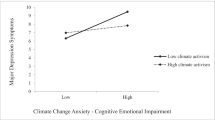Abstract
Hypotheses about the relationship between anxiety and affiliation derived from the psychoanalytic, drive, and social comparison models were tested by exposing high anxious (HA) and low anxious (LA)Ss to stress and subsequently to conditions meant to fulfill either nurturance or information needs. Unstressed and non-need fulfilled control groups were included. (N=224 grade school children.) Stress significantly increased the strength of adult affiliating in HA Ss; nurturance reduced it. Peer affiliating was not influenced by stress or information, nor did the conditions affect the affiliation of LASs. Results supported the hypothesis that dependency motives mediate the anxiety-affiliation relationship.
Similar content being viewed by others
References
Castaneda, A., Palermo, D. S., & McCandless, B. R. Complex learning and performance as a function of anxiety in children and task difficulty.Child Development, 1956,27, 327–332.
Darley, J. M., & Aronson, E. Self-evaluation vs. direct anxiety reduction as determinants of the fear-affiliation relationship.Journal of Experimental Social Psychology Supplement, 1966,1, 66–79.
Doris, J., & Fierman, E. Humor and anxiety.Journal of Abnormal and Social Psychology, 1956,53, 59–62.
Freud, S.The problem of anxiety. (Trans, by H. A. Bunker.) New York: Norton, 1936.
Gerard, H. B., & Rabbie, J. M. Fear and social comparison.Journal of Abnormal and Social Psychology, 1961,62, 586–592.
Gewirtz, J. L., & Baer, D. M. Deprivation and satiation as drive conditions.Journal of Abnormal and Social Psychology, 1958,57, 165–172.
Helmreich, R. L., & Collins, B. E. Situational determinants of affiliative preferences under stress.Journal of Personality and Social Psychology, 1967,6, 79–85.
Lore, R. K. Palmar sweating and transitory anxiety in children.Child Development, 1964,37, 115–124.
Sarason, S. B., Davidson, K. S., Lighthall, F. F., Waite, R. R., & Ruebush, B. K.Anxiety in elementary school children. New York: Wiley, 1960.
Sarnoff, A., & Zimbardo, P. G. Anxiety, fear, and social affiliation.Journal of Abnormal and Social Psychology, 1961,62, 356–363.
Schachter, S.The psychology of affiliation. Stanford, Calif.: Stanford University Press, 1959.
Sears, R. R., Maccoby, E. E., & Levin, H.Patterns of child rearing. Evanston, Ill.: Row-Peterson, 1957.
Spence, K. W. A theory of emotionally based drive (D) and its relation to performance in simple learning situations.American Psychologist, 1958,13, 131–141.
Walters, R. H., Marshall, W. E., & Shooter, J. R. Anxiety isolation, and susceptibility to social influence.Journal of Personality, 1960,28, 518–529.
Walters, R. H., & Ray, E. Anxiety, social isolation, and reinforcer effectiveness.Journal of Personality, 1960,28, 358–367.
Author information
Authors and Affiliations
Additional information
This study is based on a doctoral dissertation completed at Yale University. The author thanks Prof. Seymour Sarason, who directed the thesis, and the children, teachers, and school psychologists of Milford, Conn. whose cooperation made this study possible.
Rights and permissions
About this article
Cite this article
McIntyre, A. Anxiety and affiliation in children. J Abnorm Child Psychol 1, 57–67 (1973). https://doi.org/10.1007/BF00917890
Issue Date:
DOI: https://doi.org/10.1007/BF00917890




